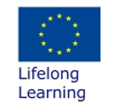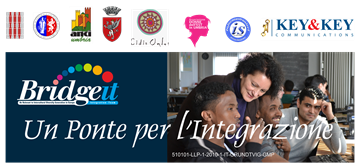SHORT TERM TARGET-GROUPS The intended end users benefiting from the project during its lifetime (and also after the project's conclusion) come from two different groups. These groups - AMs and ACMs - interact in 'first-impact' bureaucratic-institutional settings.
Examples of AMs include: newly arrived adult migrants, refugees, migrants to be regularised, but also people preparing to emigrate.
Examples of ACMs include: armed forces; border and police officers; officers in migrant centres; government and NGOs employees in contact with migration; civil servants; religious organisations; employment services; and prospective ACMs, health workers and integration organisations.
These two target-groups have been identified through previous SPICES and e-SPICES EU projects, and relevant literature on the topic (“Primo Rapporto sull'Immigrazione in Umbria”, Agenzia Umbra Ricerche, Regione Umbria, 2010; EU website on Integration).
Trainers for ICC training (for ACMs and AMs) and L2 educators (for AMs) constitute another target-group. This particular group will guarantee maximum impact of the project.
The envisaged number of people involved during the project through the Virtual Learning and Communication Environment platform (DOKEOS) is about 1200.
The first two target groups - AMs and ACMs - will be reached through network and associated partners:
for AMs
IT: Immigration centre 'Cooperativa Perusia'; CIDIS onlus (Perugia, Napoli, Caserta)
MT: Marsa Open Centre, Jesuit Refugee Service Malta
NL: Asylum Center AZC Sweikhuizen; P-team Maastricht (Platform migrant women)
AT: EUNICA; NIC; NILE; ENAR European Network Against Racism
PL: Inforeigner, Regional Center for Social Integration
BE: Foyer, Brussels
for ACMs
IT: Scuola di Pubblica Amministrazione (Pila/Perugia); ANCI UMBRIA; Regione dell'Umbria
MT: Jesuit Refugee Service Malta
NL: EMOL Network Expertise centre for integration
DE: bfz gGmbH (Berufliche Fortbildungszentren der Bayerischen Wirtschaft), e-learning and new media department (Nürnberg)
PL: "Malopolska Gateway" Regional Internet Portal; Voivodeship Headquarters of Police in Krakow
TR: Yozgat Il Emniyet Müdürlüðü (Police Department of Province); Yozgat Belediyesi (Municipality)
ACMs as well as AMs are involved in the identification and collection of written texts, video-recording of real-life interactions and corresponding verbal interactions (spoken texts), dissemination and exploitation of results. They are offered free training during the pilot training modules.
The third target-group trainers and educators - will also be reached through these organisations and finally through GRU courses and courses offered by university members, as well as private and public institutions participating in this partnership.
LONG TERM TARGET-GROUPS
Intended users who will benefit from the project after its conclusion are from the three groups described above:
AMs as adults that for political, humanitarian, economic, social, professional or cultural reasons emigrate from their own country of origin and move for a short or a long period of time in a different geographical, cultural and linguistic context (e.g. migrants, asylum seekers, refugees, as well as medical doctors, soldiers, missioners, students participating in exchange programmes, etc.).
ACMs as front-line operators in institutional settings (e.g. civil servants, operators in migrants centres, university students from the partners institutions, etc.) as well as volunteers and social workers.
Moreover, ICC trainers, mediators and facilitators, school teachers, L2 educators specialising in training for migrants and who want to work or are already employed in private or public organisations can use the training modules and courses within their current and future activities.
Long term target-groups, apart from those already involved in the project activities through the institutions described above (such as associated partners), will be reached through:
- the BRIDGE-IT Virtual Learning and Communication Environment that will be hosting the training resources
- the project website (linked to mentioned public service institutions and migrant centres, language schools, vocational training centres), that will publish regular newsletters and announce the forthcoming activities
a BRIDGE-IT Grundtvig training course published on the Comenius-Grundtvig Training data base;
- EU project websites, where the project information and outcomes will be published EU Commission and its websites and tools aimed at guaranteeing projects' visibility (such as EVE, platform for the dissemination and exploitation of results of projects funded by the EU Commission; www.spazioeuropa.eu; European website on Integration).
The university project partners (BE/IT/MT/NL) have also envisaged sustainable activities that will involve a wider number of targets: students as prospective ACMs, intercultural mediators and trainers, L2 educators.
|











































